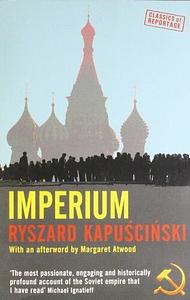Take a photo of a barcode or cover
Kapuscinski shows himself to be a remarkably compassionate writer in this account of the Soviet Union, particularly its death throes. It paints an excellent portrait of the cruel lunacies of the system, whilst being a deeply loving portrait of the ordinary people and places caught in the system
informative
I am a child of the late cold war. Most of what I knew of the Soviet Union while it still existed was fear. I would have nightmares about nuclear war and Russian attacks, but I thought very little about what it was like to be in that country. As an adult, I have visited 6 former soviet republics (although not Russia, yet) and one of them I spent most of the year in. So while I've experienced the USSR as distant bogyman as a child, and seen the ruins of the empire from the states that inherited some of its legacy, I still do not completely understand Soviet culture. What I do know always struck me as, well, just weird and really seemingly unlikely (and also often cruel).
So many of the anecdotes in this book were really fascinating to read. The problem is that the book does not have much of a focus. It is travel writing without much of an overarching theme beyond the word "Imperium." Part of the problem is the author visited the USSR at different times between 1939 and 1993 (when it wasn't the USSR anymore), a 50+ year period that the country remade itself several times from the totalitarianism of Stalin, to the dictatorship of Khrushchev, to the stagnation of Brezhnev, to perestroika and disintegration under Gorbachev.
The author was also a clear product of his own time and sometimes displayed some of his own cultural biases and blindnesses when discussing the non-slavic people of the Soviet Union. Probably my favorite line in the whole book, is when Kapuściński writes: "Only European civilization proved capable of overcoming its ethnocentrism."
So many of the anecdotes in this book were really fascinating to read. The problem is that the book does not have much of a focus. It is travel writing without much of an overarching theme beyond the word "Imperium." Part of the problem is the author visited the USSR at different times between 1939 and 1993 (when it wasn't the USSR anymore), a 50+ year period that the country remade itself several times from the totalitarianism of Stalin, to the dictatorship of Khrushchev, to the stagnation of Brezhnev, to perestroika and disintegration under Gorbachev.
The author was also a clear product of his own time and sometimes displayed some of his own cultural biases and blindnesses when discussing the non-slavic people of the Soviet Union. Probably my favorite line in the whole book, is when Kapuściński writes: "Only European civilization proved capable of overcoming its ethnocentrism."
adventurous
dark
informative
reflective
medium-paced
I gave this book four stars before, which was far too stingy. I just went back into it a bit, and it's definitely a 5-star book. His elliptical observations of the effects of a deranged political system on a broad range of peoples, deeply affecting their geography, cultures, histories and societies are striking. Pathos is evoked not through wordiness, but through a deeply humane ability to get to the core of a culture with a few short anecdotes. You may think as I do that all political systems have their pathologies, but you'll walk away from this book having a special regard for what a people-crusher the Soviet Union was.
Imperium isn't merely a travel narrative; such would ignore its vitality as palimpsest. It traverses the same roads again and again over time, it returns to immense crime scenes and it ponders a policy of ecological suicide. The book was published in 1994 just before a number of the text's issues came to boil: the two Chechen Wars. There are whispers of the rise of the oligarchs and somewhere lurking is in the frozen mist is Putin. Kapuściński has penned an amazing account of an empire. He often suffers the human failing of bullshit philosophy and guessing wrong about an inchoate state of affairs.
Stalin's chessboard left nascent atrocities across Central Asis. The author notes that dissent could've been crushed with death camps and mobile killing units, but then there would be a culpable element. Famine and cold spread the blame around. There is a sting of commiseration at the book's conclusion. I felt the stab of such as well.
Stalin's chessboard left nascent atrocities across Central Asis. The author notes that dissent could've been crushed with death camps and mobile killing units, but then there would be a culpable element. Famine and cold spread the blame around. There is a sting of commiseration at the book's conclusion. I felt the stab of such as well.
adventurous
dark
funny
informative
inspiring
reflective
Mögnuð persónuleg ferðasaga skrifuð við hrun Sovétríkjanna byggð á ferðum og kynnum Kapuscinskis af þeim á löngu tímabili. Dapurlegar lýsingar á kjörum fólks, samfélagsgerð og erfiðri náttúru.
adventurous
emotional
informative
reflective
sad

